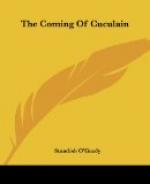And they said, “Who art thou?”
And he answered, “I am the son of Dectera of Dun Dalgan, and nephew of the king.”
Then the boy who was captain of the whole school, and the biggest and strongest, stood over him, and said—
“Thou, the king’s nephew! the son of Sualtam and Dectera of Dun Dalgan! and comest hither without chariots and horsemen and a prince’s retinue and guard. Nay, thou art a churl and a liar to boot, and hie thee hence now with wings at thy heels or verily with sore blows I shall beat thee off the lawn.”
Thereat the blood forsook thy face, O Setanta, O peerless one, and thou stoodest like a still figure carved out of white marble, with the pallor of death in thy immortal face. But that other, indignant to see him stand as one both deaf and dumb, and mistaking his pallor for fear, raised his hurle and struck with all his might at the boy. Setanta sprang back avoiding the blow, and ere the other could recover himself, struck him back-handed over the right ear, whose knees were suddenly relaxed and the useless weapon shaken from his hands. Then some stood aside, but the rest ran upon Setanta to beat him off the lawn and struck at him all together, as well as they could, for their numbers impeded them, and fiercely the stranger defended himself, and many a shrewd stroke he delivered upon his enemies, for the slumbering war-spirit now, for the first time, had awaked in his gentle heart. Many times he was overborne and flung to the ground, but again he arose overthrowing others, never quitting hold of his hurle, and, whenever he got a free space, grasping that weapon like a war-mace in both hands, he struck down his foes. The skirts of his mantle were torn, only a rag remained round his shoulders, fastened by the brooch; he was covered with blood, his own and his enemies’, and his eyes were like burning fire. Then Conall Carna being enraged ran towards the boys, meaning to rebuke their cowardice and with his strong hands hurl them asunder and save the stranger boy. There was not a knight in all Ireland those days who loved battle-fairness better than Conall Carna. Truly he was the pure-burning torch of the chivalry of the Ultonians in his time. But as he ran one withheld him and a voice crying “Forbear” rang in his ears. Yet he saw no man. He stood still, being astonished, and became aware that this tumult was divinely guided, for as in a trance he saw and heard marvellous things. For the war-steeds of the Ultonians neighed loudly in their stables, and from the Tec Brac, the Speckled House of the Red Branch, rose a clangour of brass, the roar of the shield called Ocean, and the booming of the Gate-of-Battle, and the singing of swords long silent, and the brazen thunder of the revolution of wheels; and he saw strange forms and faces in the air, and the steady sun dancing in the heavens, and a man standing beside the stranger whose face was like the sun. The son of Amargin saw and heard all, for he was a seer and a prophet




